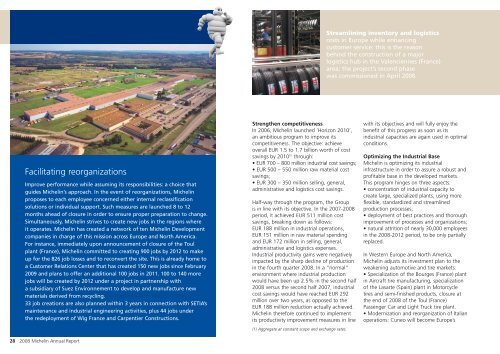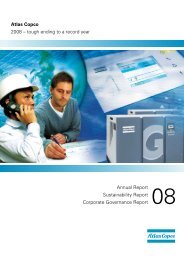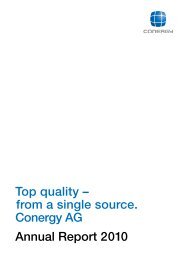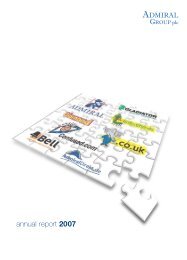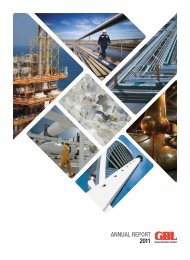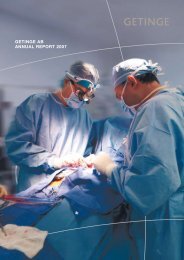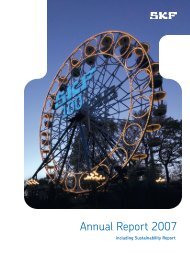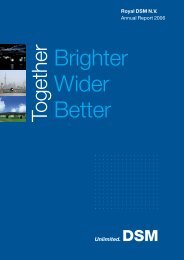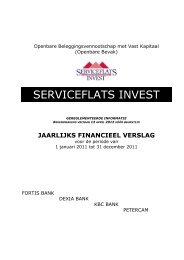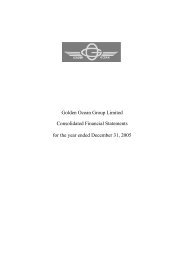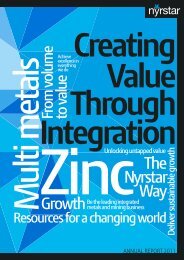MICHELIN - 2008 ANNUAL REPORT
MICHELIN - 2008 ANNUAL REPORT
MICHELIN - 2008 ANNUAL REPORT
You also want an ePaper? Increase the reach of your titles
YUMPU automatically turns print PDFs into web optimized ePapers that Google loves.
Streamlining inventory and logistics<br />
costs in Europe while enhancing<br />
customer service: this is the reason<br />
behind the construction of a major<br />
logistics hub in the Valenciennes (France)<br />
area; the project’s second phase<br />
was commissioned in April <strong>2008</strong>.<br />
Facilitating reorganizations<br />
Improve performance while assuming its responsibilities: a choice that<br />
guides Michelin’s approach. In the event of reorganizations, Michelin<br />
proposes to each employee concerned either internal reclassification<br />
solutions or individual support. Such measures are launched 8 to 12<br />
months ahead of closure in order to ensure proper preparation to change.<br />
Simultaneously, Michelin strives to create new jobs in the regions where<br />
it operates. Michelin has created a network of ten Michelin Development<br />
companies in charge of this mission across Europe and North America.<br />
For instance, immediately upon announcement of closure of the Toul<br />
plant (France), Michelin committed to creating 900 jobs by 2012 to make<br />
up for the 826 job losses and to reconvert the site. This is already home to<br />
a Customer Relations Center that has created 150 new jobs since February<br />
2009 and plans to offer an additional 100 jobs in 2011. 100 to 140 more<br />
jobs will be created by 2012 under a project in partnership with<br />
a subsidiary of Suez Environnement to develop and manufacture new<br />
materials derived from recycling.<br />
33 job creations are also planned within 3 years in connection with SETIA’s<br />
maintenance and industrial engineering activities, plus 44 jobs under<br />
the redeployment of Wig France and Carpentier Constructions.<br />
28 <strong>2008</strong> Michelin Annual Report<br />
Strengthen competitiveness<br />
In 2006, Michelin launched ’Horizon 2010’,<br />
an ambitious program to improve its<br />
competitiveness. The objective: achieve<br />
overall EUR 1.5 to 1.7 billion worth of cost<br />
savings by 2010 (1) through:<br />
• EUR 700 – 800 million industrial cost savings;<br />
• EUR 500 – 550 million raw material cost<br />
savings;<br />
• EUR 300 – 350 million selling, general,<br />
administrative and logistics cost savings.<br />
Half-way through the program, the Group<br />
is in line with its objective. In the 2007-<strong>2008</strong><br />
period, it achieved EUR 511 million cost<br />
savings, breaking down as follows:<br />
EUR 188 million in industrial operations,<br />
EUR 151 million in raw material spending<br />
and EUR 172 million in selling, general,<br />
administrative and logistics expenses.<br />
Industrial productivity gains were negatively<br />
impacted by the sharp decline of production<br />
in the fourth quarter <strong>2008</strong>. In a “normal”<br />
environment where industrial production<br />
would have been up 2.5% in the second half<br />
<strong>2008</strong> versus the second half 2007, industrial<br />
cost savings would have reached EUR 292<br />
million over two years, as opposed to the<br />
EUR 188 million reduction actually achieved.<br />
Michelin therefore continued to implement<br />
its productivity improvement measures in line<br />
(1) Aggregate at constant scope and exchange rates.<br />
with its objectives and will fully enjoy the<br />
benefit of this progress as soon as its<br />
industrial capacities are again used in optimal<br />
conditions.<br />
Optimizing the Industrial Base<br />
Michelin is optimizing its industrial<br />
infrastructure in order to assure a robust and<br />
profitable base in the developed markets.<br />
This program hinges on three aspects:<br />
• concentration of industrial capacity to<br />
create large, specialized plants, using more<br />
flexible, standardized and streamlined<br />
production processes;<br />
• deployment of best practices and thorough<br />
improvement of processes and organizations;<br />
• natural attrition of nearly 30,000 employees<br />
in the <strong>2008</strong>-2012 period, to be only partially<br />
replaced.<br />
In Western Europe and North America,<br />
Michelin adjusts its investment plan to the<br />
weakening automotive and tire markets:<br />
• Specialization of the Bourges (France) plant<br />
in Aircraft tire manufacturing, specialization<br />
of the Lasarte (Spain) plant in Motorcycle<br />
tires and semi-finished products, closure at<br />
the end of <strong>2008</strong> of the Toul (France)<br />
Passenger Car and Light Truck tire plant.<br />
• Modernization and reorganization of Italian<br />
operations: Cuneo will become Europe’s


